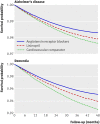Use of angiotensin receptor blockers and risk of dementia in a predominantly male population: prospective cohort analysis
- PMID: 20068258
- PMCID: PMC2806632
- DOI: 10.1136/bmj.b5465
Use of angiotensin receptor blockers and risk of dementia in a predominantly male population: prospective cohort analysis
Abstract
Objective: To investigate whether angiotensin receptor blockers protect against Alzheimer's disease and dementia or reduce the progression of both diseases.
Design: Prospective cohort analysis.
Setting: Administrative database of the US Veteran Affairs, 2002-6. Population 819 491 predominantly male participants (98%) aged 65 or more with cardiovascular disease.
Main outcome measures: Time to incident Alzheimer's disease or dementia in three cohorts (angiotensin receptor blockers, lisinopril, and other cardiovascular drugs, the "cardiovascular comparator") over a four year period (fiscal years 2003-6) using Cox proportional hazard models with adjustments for age, diabetes, stroke, and cardiovascular disease. Disease progression was the time to admission to a nursing home or death among participants with pre-existing Alzheimer's disease or dementia.
Results: Hazard rates for incident dementia in the angiotensin receptor blocker group were 0.76 (95% confidence interval 0.69 to 0.84) compared with the cardiovascular comparator and 0.81 (0.73 to 0.90) compared with the lisinopril group. Compared with the cardiovascular comparator, angiotensin receptor blockers in patients with pre-existing Alzheimer's disease were associated with a significantly lower risk of admission to a nursing home (0.51, 0.36 to 0.72) and death (0.83, 0.71 to 0.97). Angiotensin receptor blockers exhibited a dose-response as well as additive effects in combination with angiotensin converting enzyme inhibitors. This combination compared with angiotensin converting enzyme inhibitors alone was associated with a reduced risk of incident dementia (0.54, 0.51 to 0.57) and admission to a nursing home (0.33, 0.22 to 0.49). Minor differences were shown in mean systolic and diastolic blood pressures between the groups. Similar results were observed for Alzheimer's disease.
Conclusions: Angiotensin receptor blockers are associated with a significant reduction in the incidence and progression of Alzheimer's disease and dementia compared with angiotensin converting enzyme inhibitors or other cardiovascular drugs in a predominantly male population.
Conflict of interest statement
Competing interests: BW and RAW received a grant award from the Retirement Research Foundation to fund this research. BW received a donation from the Casten Foundation to fund this research.
Figures


Comment in
-
Antihypertensive agents and prevention of dementia.BMJ. 2010 Jan 12;340:b5409. doi: 10.1136/bmj.b5409. BMJ. 2010. PMID: 20068256 No abstract available.
-
Angiotensin receptor blocker use may decrease the incidence and progression of Alzheimer's disease and dementia in older men but the strength of the evidence is questionable.J Clin Hypertens (Greenwich). 2010 Jun;12(6):444-6. doi: 10.1111/j.1751-7176.2010.00300.x. J Clin Hypertens (Greenwich). 2010. PMID: 20591090 Free PMC article. No abstract available.
-
Angiotensin receptor blockers associated with decreased incidence and progression of dementia in older men with cardiovascular disease.Evid Based Ment Health. 2010 Aug;13(3):75. doi: 10.1136/ebmh.13.3.75. Evid Based Ment Health. 2010. PMID: 20682815 No abstract available.
Similar articles
-
Angiotensin-converting enzyme inhibitors and angiotensin II receptor blockers reduced dementia risk in patients with diabetes mellitus and hypertension.Int J Cardiol. 2016 Oct 1;220:462-6. doi: 10.1016/j.ijcard.2016.06.215. Epub 2016 Jun 27. Int J Cardiol. 2016. PMID: 27390970
-
Angiotensin receptor blockers and risk of dementia: cohort study in UK Clinical Practice Research Datalink.Br J Clin Pharmacol. 2015 Feb;79(2):337-50. doi: 10.1111/bcp.12511. Br J Clin Pharmacol. 2015. PMID: 25223602 Free PMC article.
-
Beneficial association of angiotensin-converting enzyme inhibitors and statins on the occurrence of possible Alzheimer's disease after traumatic brain injury.Alzheimers Res Ther. 2020 Mar 27;12(1):33. doi: 10.1186/s13195-020-00589-3. Alzheimers Res Ther. 2020. PMID: 32220235 Free PMC article.
-
Angiotensin-converting enzyme inhibitors reduce mortality compared to angiotensin receptor blockers: Systematic review and meta-analysis.Eur J Prev Cardiol. 2017 Dec;24(18):1914-1924. doi: 10.1177/2047487317728766. Epub 2017 Sep 1. Eur J Prev Cardiol. 2017. PMID: 28862020 Review.
-
Prevention of dementia by antihypertensive drugs: how AT1-receptor-blockers and dihydropyridines better prevent dementia in hypertensive patients than thiazides and ACE-inhibitors.Expert Rev Neurother. 2009 Sep;9(9):1413-31. doi: 10.1586/ern.09.89. Expert Rev Neurother. 2009. PMID: 19769454 Review.
Cited by
-
Impact of COVID-19 on Alzheimer's Disease Risk: Viewpoint for Research Action.Healthcare (Basel). 2020 Aug 21;8(3):286. doi: 10.3390/healthcare8030286. Healthcare (Basel). 2020. PMID: 32839380 Free PMC article.
-
Telmisartan ameliorates lipopolysaccharide-induced innate immune response through peroxisome proliferator-activated receptor-γ activation in human monocytes.J Hypertens. 2012 Jan;30(1):87-96. doi: 10.1097/HJH.0b013e32834dde5f. J Hypertens. 2012. PMID: 22124178 Free PMC article.
-
Drug repositioning for Alzheimer's disease.Nat Rev Drug Discov. 2012 Nov;11(11):833-46. doi: 10.1038/nrd3869. Nat Rev Drug Discov. 2012. PMID: 23123941 Review.
-
Sequence variants of interleukin 6 (IL-6) are significantly associated with a decreased risk of late-onset Alzheimer's disease.J Neuroinflammation. 2012 Jan 24;9:21. doi: 10.1186/1742-2094-9-21. J Neuroinflammation. 2012. PMID: 22272811 Free PMC article.
-
What have we learned from the streptozotocin-induced animal model of sporadic Alzheimer's disease, about the therapeutic strategies in Alzheimer's research.J Neural Transm (Vienna). 2013 Jan;120(1):233-52. doi: 10.1007/s00702-012-0877-9. Epub 2012 Aug 12. J Neural Transm (Vienna). 2013. PMID: 22886150 Review.
References
-
- Whitmer RA, Sidney S, Selby J, Johnston SC, Yaffe K. Midlife cardiovascular risk factors and risk of dementia in late life. Neurology 2005;64:277-81. - PubMed
-
- Nash DT, Fillit H. Cardiovascular disease risk factors and cognitive impairment. Am J Cardiol 2006;97:1262-5. - PubMed
-
- Newman AB, Fitzpatrick AL, Lopez O, Jackson S, Lyketsos C, Jagust W, et al. Dementia and Alzheimer’s disease incidence in relationship to cardiovascular disease in the Cardiovascular Health Study cohort. J Am Geriatr Soc 2005;53:1101-7. - PubMed
Publication types
MeSH terms
Substances
LinkOut - more resources
Full Text Sources
Other Literature Sources
Medical
